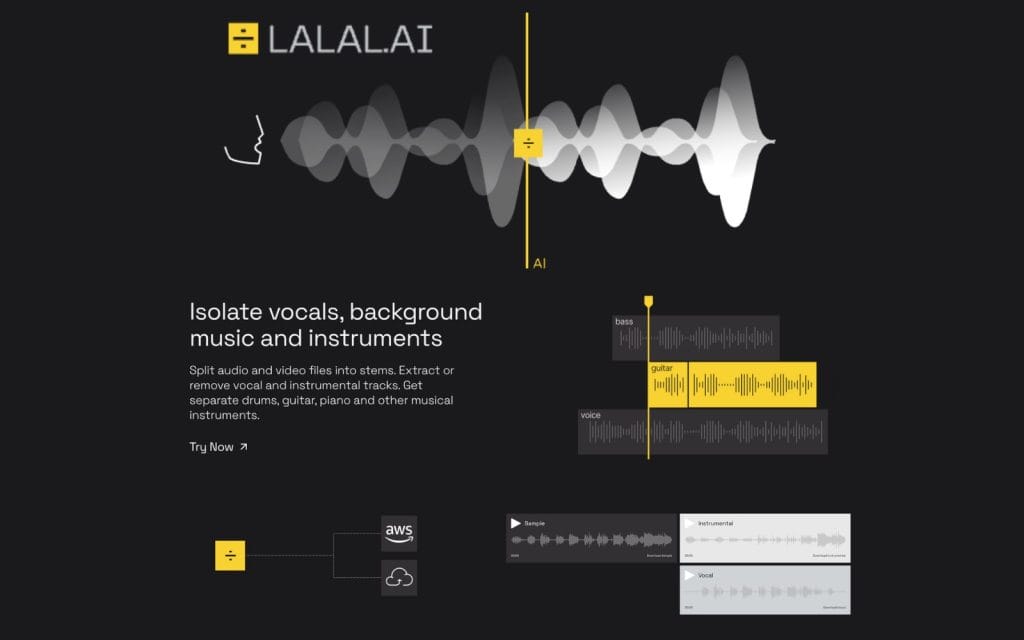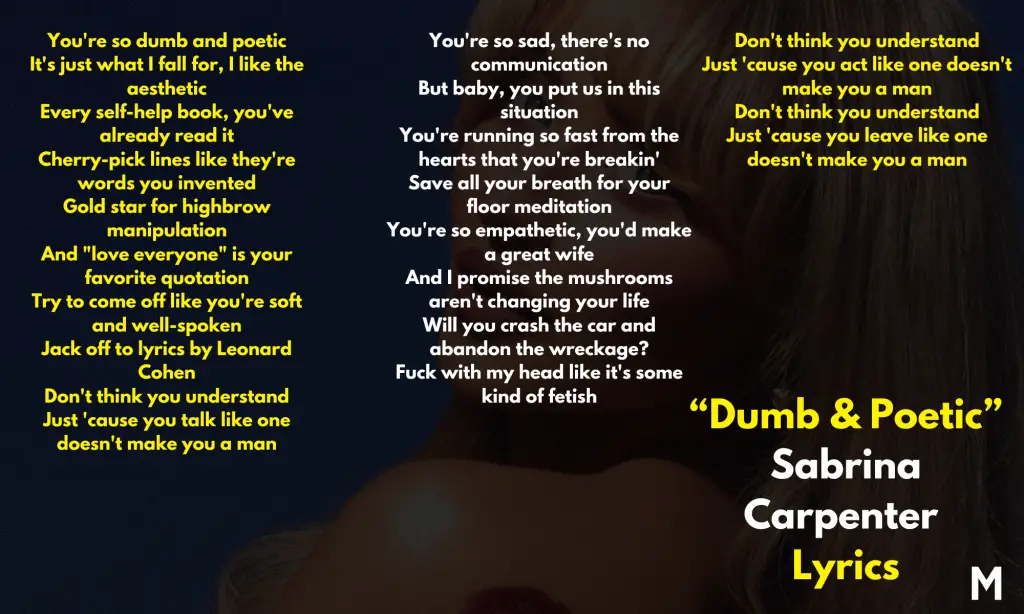Table of Contents
Image C/O 2024 Island Records, a division of UMG Recordings, Inc.
In Sabrina Carpenter’s song Dumb & Poetic, she gives us a raw critique of someone who tries hard to come off as sensitive and deep but misses the mark on genuine connection. The lyrics take sharp aim at a certain kind of “performative empathy”—a person who borrows from self-help books, meditation practices, and poetic quotes but still manages to come across as shallow. I’ll be using my background in English literature and creative writing here to analyze Carpenter’s lyrics in a more literary light, drawing connections to classic poets and themes. These are my own thoughts, but by looking through the lens of literary history, I think we can get to the heart of Carpenter’s takedown.
Fans have speculated that this song might be about Shawn Mendes, especially given Carpenter’s references to “floor meditation” and “self-help books”—both things Mendes has spoken about openly.
In fact, Mendes once admitted he’d read “55 self-help books” to work through stress and self-image. Whether or not the song is really about him, Dumb & Poetic is a great chance to dig into the difference between an authentic inner life and one that’s all for show. I’m excited to stretch some literary comparisons here, connecting Carpenter’s themes with poets like Philip Larkin, Weldon Kees, and Louise Glück, each of whom has tackled similar themes of authenticity, empathy, and human complexity.
Sabrina Carpenter Dumb & Poetic Lyrics
Sabrina Carpenter Dumb & Poetic Meaning
“You’re so dumb and poetic / It’s just what I fall for, I like the aesthetic”
These lines set the stage for the speaker’s frustration with their partner’s shallow attempts at appearing wise or empathetic. The speaker admits that they’re initially drawn to this “poetic” image, but deep down, they know it’s all just a look — an “aesthetic” without real meaning. This tension reminds me of Philip Larkin’s straightforward critique of hollow wisdom in his poem This Be The Verse, where he writes, “They fuck you up, your mum and dad. / They may not mean to, but they do.” Larkin’s tone is blunt and unsentimental, exposing how family wisdom, even if well-intentioned, can often cause harm. The speaker in the song feels similarly about their partner’s “wisdom”: it might look nice on the surface, but it doesn’t hold up under real scrutiny. Just like in Larkin’s poem, there’s a disconnect between how things look and how they actually affect others.
“Gold star for highbrow manipulation / And ‘love everyone’ is your favorite quotation”
Here, the speaker is calling out the partner’s performative kindness. The phrase “highbrow manipulation” suggests that their partner uses big ideas or quotes to seem insightful, but it’s all just for show. When the speaker says “‘love everyone’ is your favorite quotation,” it’s clear they don’t buy into the partner’s “love” — they see it as fake and self-serving.
This reminds me of Weldon Kees’s poem For My Daughter, where Kees questions appearances, even in seemingly innocent people or ideas. He writes, “Looking into my daughter’s eyes I read / Beneath the innocence of morning flesh.” Even in a young child, Kees sees the potential for darkness, suggesting that what looks “pure” or “loving” on the outside may not be as simple as it seems. Similarly, the speaker in these lyrics sees through the partner’s “love everyone” attitude, understanding it as a hollow phrase rather than a true commitment to others.
“Don’t think you understand / Just ‘cause you talk like one doesn’t make you a man”
In this line, the speaker takes direct aim at the partner’s lack of true wisdom. The partner thinks that talking in a “wise” way — quoting poets like Leonard Cohen, for instance — makes him mature or deep, but the speaker knows better. They’re saying that talking a certain way doesn’t make someone a man; it’s just a mask for real understanding and maturity.
This line connects with Louise Glück’s poem The Triumph of Achilles, where she writes, “In his tent, Achilles / Grieved with his whole being.” In Glück’s portrayal, Achilles’ emotions aren’t just words or an act; they’re raw, real, and deeply felt. Unlike the partner in the song, Achilles isn’t performing or trying to appear wise — he’s experiencing genuine grief. The speaker in these lyrics seems to want that kind of authenticity and depth from their partner, not someone who just “talks like one.”
“You’re so empathetic, you’d make a great wife”
With this sarcastic line, the speaker mocks the partner’s supposed “empathy,” suggesting that it’s shallow and insincere. The partner might see himself as sensitive and caring, but to the speaker, this empathy is as superficial as the rest of his persona.
This idea of shallow empathy also brings to mind The Triumph of Achilles, where Glück explores how real empathy and connection require genuine emotion, not just empty gestures. In that poem, Achilles’ vulnerability and grief are honest and unfiltered. The speaker here is clearly looking for that kind of authenticity — a partner who feels deeply, rather than someone who only plays the part of an “empathetic” person.
“Just ‘cause you leave like one doesn’t make you a man”
In these final lines, the speaker takes a final shot at their partner’s immaturity, saying that leaving — or detaching emotionally — doesn’t make him grown-up or wise. The speaker seems to feel that their partner’s supposed “wisdom” and independence are just another act, not the real depth or maturity they claim to have.
This line reminds me again of Philip Larkin’s skepticism in This Be The Verse. Just like Larkin criticizes the false “wisdom” passed down in families, the speaker here criticizes the partner’s supposed maturity. Larkin’s line “They may not mean to, but they do” captures how people pass on flawed ideas without realizing it, and in a similar way, the partner in this song might not realize how shallow his actions appear.
Themes, Meanings, and Main Takeaways
In Dumb & Poetic, Sabrina Carpenter digs into the frustrations of dating someone who seems more invested in projecting sensitivity and wisdom than actually living by it. The song highlights a type of person who cherry-picks “highbrow” phrases and leans on self-help clichés to look like they’ve got things figured out. Carpenter’s critique, especially with lines like “Gold star for highbrow manipulation,” echoes the bluntness we see in Philip Larkin’s This Be The Verse, where Larkin famously calls out the emptiness of handed-down “wisdom.” The speaker in Dumb & Poetic is frustrated by the partner’s apparent lack of depth and accountability, much like Larkin’s speaker is fed up with the hollow advice passed down through generations.
Just as Larkin holds up a mirror to inherited flaws, Carpenter’s lyrics suggest that wisdom without genuine self-awareness can do more harm than good.
The song’s second verse, where Carpenter pokes at the partner’s love of meditation and “floor meditations,” brings to mind Weldon Kees’ For My Daughter, a poem that casts doubt on seemingly innocent or “good” appearances. In Kees’ poem, even a young child’s innocence doesn’t escape his suspicion; he’s fully aware that appearances don’t guarantee authenticity.
Carpenter’s line “Save all your breath for your floor meditation” takes a similar jab, suggesting her partner’s introspective practices might look meaningful but ultimately don’t make him any better at real relationships. Articles and fan theories suggest this could be a swipe at someone like Shawn Mendes, who has openly talked about his reliance on self-help books and meditation. In this light, the lyrics feel like a reminder that even “high-minded” pursuits don’t substitute for real empathy or growth if they’re just surface-level.
Toward the end of the song, Carpenter challenges her partner’s supposed maturity with the lines, “Just ’cause you talk like one doesn’t make you a man.” This echoes themes from Louise Glück’s The Triumph of Achilles, where Achilles’ grief is intense and authentic, raw in a way that doesn’t rely on “looking” wise. Glück’s portrayal of Achilles is grounded in real feeling, not showy gestures, which connects with Carpenter’s critique of her partner’s performative masculinity.
Fans have noticed Carpenter’s references to Leonard Cohen lyrics and “therapy buzzwords” in the song, seeing these as subtle jabs at the partner’s shallow attempts to look thoughtful. In both The Triumph of Achilles and Dumb & Poetic, there’s a clear message: real depth and strength come from authenticity, not from putting on a well-read, “manly” act. These poetic parallels help emphasize the song’s main point—that true connection and empathy can’t be faked or cherry-picked; they have to be lived and felt genuinely.
The post Sabrina Carpenter Dumb & Poetic Lyrics and Meaning: An Honest Look at Self-Image in Love appeared first on Magnetic Magazine.






